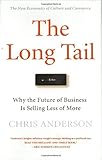 Chris Anderson’s book The Long Tail, is one of the business books that I found really interesting and worthy of reading, in how it explains and advocates why the future of business is selling less of more, as it’s title clearly puts it.
Chris Anderson’s book The Long Tail, is one of the business books that I found really interesting and worthy of reading, in how it explains and advocates why the future of business is selling less of more, as it’s title clearly puts it.
It all started with an article Chris Anderson, who is editor-in-chief of Wired Magazine, wrote in Wired that was called “The Long Tail” and that became quite popular and famous; after that he started a blog about it and then expanded his thoughts into a book.
In short the phrase “The Long Tail” is to describe certain business and economic models where products that are in low demand or have low sales volume can collectively make up a market share that rivals or exceeds the relatively few current bestsellers and blockbusters, if the store or distribution channel is large enough and the necessary filters are available to drive people to find these products. Examples of companies using such a model are Amazon, Netflix, iTunes and Google.
The book and the concept are very interesting, and with the evolution of the internet it’s easier than ever to cater to all tastes and provide all products: general best-sellers and niche products, increasing the scope of products available for sale, and obviously the opportunities to make more revenue.
If you’re selling products, marketing them or just interested in business: I recommend you read the article as well as the book; they’re really interesting and provide several examples and rich insight into how the business world and markets are changing.
# Amazon: The Long Tail




